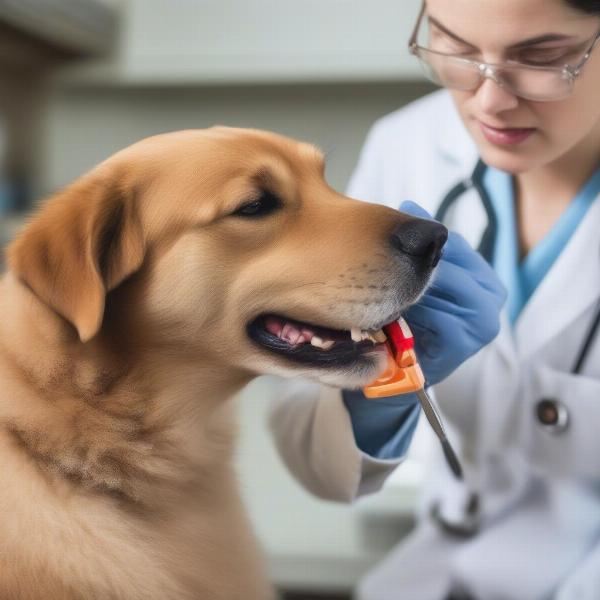Dry mouth and lip smacking in dogs can be concerning for pet owners. While sometimes a simple case of thirst, these symptoms can also indicate underlying health issues. This article will explore the various reasons why your dog might be experiencing dry mouth and smacking lips, how to identify the potential cause, and what steps you can take to address it.
Understanding Dry Mouth (Xerostomia) in Dogs
Dry mouth, medically known as xerostomia, occurs when saliva production decreases. Saliva plays a crucial role in a dog’s oral health, aiding in digestion, lubricating food, and protecting against bacteria. A reduction in saliva can lead to discomfort, difficulty eating, and increased susceptibility to dental problems. Lip smacking is often a dog’s way of trying to stimulate saliva production when their mouth feels dry.
Common Causes of Dry Mouth and Lip Smacking
Several factors can contribute to dry mouth and lip smacking in dogs. Some of the most common include:
- Dehydration: The simplest and most easily remedied cause is dehydration. Ensure your dog has access to fresh, clean water at all times, especially during hot weather or after exercise.
- Anxiety or Stress: Just like humans, dogs can experience dry mouth as a symptom of anxiety or stress. Observe your dog’s behavior for other signs of stress, such as excessive panting, pacing, or destructive chewing.
- Medication Side Effects: Certain medications, such as antihistamines, diuretics, and some pain relievers, can cause dry mouth as a side effect. If your dog is on medication, consult your veterinarian to see if dry mouth is a listed side effect.
- Underlying Medical Conditions: More serious causes of dry mouth can include kidney disease, diabetes, autoimmune diseases (like Sjogren’s syndrome), and neurological disorders. These conditions often present other symptoms, so it’s important to consult your vet for a proper diagnosis.
- Nausea: Nausea can also lead to increased salivation initially, followed by dry mouth and lip smacking as the dog tries to cope with the discomfort.
When to Seek Veterinary Attention
While occasional lip smacking is normal, persistent dry mouth accompanied by other symptoms warrants a visit to the veterinarian. These symptoms might include:
- Excessive thirst
- Changes in appetite
- Lethargy
- Vomiting
- Bad breath
- Difficulty swallowing
- Red or inflamed gums
How is Dry Mouth Diagnosed?
Your veterinarian will conduct a thorough physical examination and gather information about your dog’s medical history and current symptoms. They may perform blood tests, urinalysis, or salivary flow tests to determine the underlying cause of the dry mouth.
Treatment Options for Dry Mouth in Dogs
Treatment will depend on the underlying cause. For dehydration, ensuring adequate water intake is usually sufficient. If medication is the culprit, your vet might suggest switching to a different drug or adjusting the dosage. For underlying medical conditions, managing the primary disease is crucial. In some cases, your vet might prescribe medication to stimulate saliva production or recommend artificial saliva substitutes.
Home Care for Dogs with Dry Mouth
- Ensure constant access to fresh water.
- Offer ice chips or frozen treats.
- Add moisture to your dog’s food by mixing in a little water or broth.
- Avoid dry, crunchy treats.
- Maintain good oral hygiene through regular brushing and professional dental cleanings.
Is Dry Mouth Painful for Dogs?
Yes, dry mouth can be uncomfortable and even painful for dogs. The lack of saliva can lead to dry, sticky gums, making it difficult to chew and swallow. It also increases the risk of oral infections and dental disease.
 Veterinary Examination for Dog's Dry Mouth
Veterinary Examination for Dog's Dry Mouth
Conclusion
Dry mouth and smacking lips in dogs can signal anything from simple thirst to a more serious medical condition. Paying close attention to your dog’s behavior and seeking veterinary care when necessary will help ensure their comfort and well-being. By addressing the underlying cause and providing appropriate care, you can help your furry friend maintain a healthy, happy mouth.
FAQ
- How can I tell if my dog is dehydrated? Check for dry gums, sunken eyes, and loss of skin elasticity. If you gently pinch the skin on the back of their neck, it should quickly spring back into place.
- What are some good ways to encourage my dog to drink more water? Try offering flavored water, using a pet fountain, or placing multiple water bowls around the house.
- Can stress really cause dry mouth in dogs? Yes, just like in humans, stress can trigger a dry mouth response in dogs.
- Is dry food bad for dogs with dry mouth? Dry food can exacerbate dry mouth. Adding water or broth can make it easier to eat.
- What is Sjogren’s syndrome in dogs? Sjogren’s syndrome is an autoimmune disease that affects the tear and salivary glands, leading to dry eyes and dry mouth.
- Are there any over-the-counter remedies for dry mouth in dogs? It’s always best to consult your veterinarian before giving your dog any medication, even over-the-counter ones.
- Can dental disease cause dry mouth? While dental disease can cause discomfort in the mouth, it typically doesn’t directly cause dry mouth.
ILM Dog is your trusted source for expert advice on all aspects of dog care, from breed selection and puppy care to senior dog health and training. Our mission is to empower dog owners worldwide with reliable, practical information to help them provide the best possible care for their canine companions. Whether you’re a seasoned dog owner or just starting your journey, we’re here to support you every step of the way. We offer expert guidance on Dog Breeds and Selection, Health and Medical Care, Training and Behavior, Nutrition and Feeding, Grooming, Products, and Accessories. Contact us at [email protected] or +44 20-3965-8624 for personalized advice and support. ILM Dog is dedicated to helping you and your dog thrive.